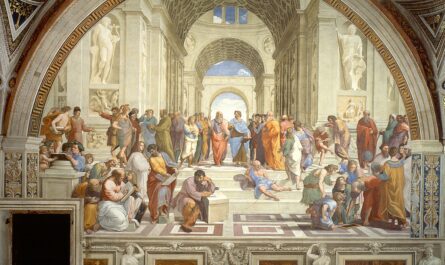One of the most storied friendships in American history came to a close in 1862, with the death of Henry David Thoreau. Ralph Waldo Emerson published a poignant tribute to his dear friend in that year’s August issue of The Atlantic Monthly. In this essay, Emerson memorializes the naturalist, extolling his virtues of independent thinking; his choice to live a simpler, more satisfied life; the discipline revealed in his physical regimen, and his brilliant talent for naturalism. Today we will look at these qualities as Emerson describes them.
Thoreau committed himself to living well. This included thinking independently, and coming to conclusions he saw fit, even if society disagreed. In 1847, he famously refused to pay his local taxes because he disagreed with the way the funds were spent, namely, in protestation of slavery. He stood by this conviction and actually went to jail for his refusal to pay. To Thoreau’s protest, a friend paid this tax for him. The following year and every year after, his friends paid this local tax for him. He didn’t agree with it, but he did let the matter rest.
“He declined to give up his large ambitions of knowledge and action for any narrow craft or profession, aiming at a much more comprehensive calling, the art of living well. If he slighted and defied the opinions of others, it was only that he was more intent to reconcile his practice with his own belief.”
Thoreau came to his own conclusions and refused to be swayed or enticed by popular tastes, whether social or political. We can all learn from such an example, and consider, “What is worth being immovable about?” What values or ideas are we staunchly unwilling to compromise? Thoreau’s character came from an inner satisfaction that he was living out his considered principles. When you act from an inner conviction, you no longer need society’s blessing.
The above quote also touches on the timely sentiment of living a holistic life. Deciding what you want to do in life is incredibly important, but it isn’t limited to the career you choose. You are more than a profession; you are more than a paycheck or cog in a machine. Incredibly, Thoreau modeled this over a century ago in that he refused to define a career path, and instead lived the life in which he found value.
“When asked at table what dish he preferred, he answered, “The nearest.”
Thoreau did not esteem financial riches, exotic delicacies, elegant trinkets, or most of the other markers of success lauded by society. Emerson tells a story early in his essay of Thoreau working tirelessly to create a better pencil. His father was a lead pencil manufacturer; the younger Thoreau grew up learning the industry, and was convinced he could improve the design. As a young man, his design gained the esteem of designers and scientists in Boston, who considered his plan equal to the finest being produced at the time. This accolade would have been a virtual guarantor of financial success – for anyone other than Thoreau, that is. Instead, Thoreau was satisfied with having achieved his goal of creating a better pencil and never patented or put that design into production. He remarked that he never would make another pencil, “Why should I? I would not do again what I have done once.”
“He thought that without religions or devotion of some kind nothing great was ever accomplished…”
If one were to describe Thoreau’s life philosophy in a single phrase, it might be “studied simplicity.” Leading such a life of simplicity, it seems, is a lost art. Many are attempting to recapture it, in the form of Marie Kondo-ing their closets and garages, or “curating” and “editing” their lives. Likewise, the minimalist approach to life advises us to eschew possessions, and instead find fulfillment in the moments and people with whom you spend your life. Currently, these sentiments seem to be niche, rather than a cultural movement. The capitalist drive and resulting materialism make it seem normal, even necessary, to scoop up the latest, greatest gadget only to replace it with a newer model in a year. This is clearly the case today, however, this is not strictly a modern problem. Emerson details the many elevated tastes Thoreau never cultivated within himself, illustrating in the process that societies have always found a hierarchy of goods and services to rank one another against. Thoreau, however, understood that a rich life, to borrow a phrase from Ramit Sethi, is about pursuing whole-heartedly the aspects of life you love, and eliminating the rest. Most of those joy-bringing elements are not objects, but engagement. Thoreau threw himself into learning physical crafts and skills, and supported himself through them.
“He chose to be rich my making his wants few, and supplying them himself.”
What are we chasing, striving, working toward? Is your path in life directed from a place of conviction and desire to improve yourself and those around you? Or are we simply chasing carrots hoping they will fulfill us, hoping that if we get enough zeroes in the bank, we’ll have “enough”. The truth is, chasing success for its own sake never produces enough. Happiness and fulfillment aren’t found in a net worth. They are only found in bringing meaning to your days, choices, and action. There has to be a foundational purpose to the striving and earning. We’ve all heard the stories of millionaires on their deathbeds wishing they’d just once pursued their convictions and deepest desires. We are meant to be pulled toward purpose, not to chase empty trophies. Thoreau’s life exemplifies this truth; working with his own hands brought him joy, being in nature brought him peace, and working to catalog the flora and fauna of Massachusetts brought him fulfillment.
“He said he wanted every stride his legs made. The length of his walk uniformly made the length of his writing. If shut up in the house he did not write at all.”
In describing Thoreau’s physical capabilities, Emerson alludes to the connection between fitness of the body and the mind. Thoreau’s skill and health were clearly factors in his ability to endure the elements as long as he did. The natural world both requires and develops hardiness. As any athlete can tell you, physical exertion yields physical and psychological benefits, often in the forms of confidence in one’s abilities and a willingness to undertake challenges. The mental and physical toll exacted in turn produces a hardiness and self-sufficiency, which became the highest values of Thoreau and Emerson both, and was ultimately translated into their Transcendental philosophy of life.
Happily, Thoreau was also a writer, and recorded his thoughts and convictions, in addition to his recording of nature’s occurrences. His journals continue to help environmentalists to this day. His Civil Disobedience has been cited as a notable influence by such thinkers as Dr. Martin Luther King, Jr and Leo Tolstoy, while Walden continues to inspire and remind readers the world over of our very human need for solitude, reflection, and nature.
Thoreau’s love of nature, and his patience and diligence in recording her ebbs and flows, of familiarizing himself with the trees, flowers, creatures, and insects populating the forests of Massachusetts, earned him a deep respect in the hearts of farmers and townsmen alike. He possessed a peculiar familiarity with nature, evidenced by Emerson’s description, “Snakes coiled around his legs; the fishes swam into his hand, and he took them out of the water; he pulled the woodchuck our of its hole by the tail, and took the foxes under his protection from the hunters.”
It seems Thoreau followed his natural outdoor ability, and developed it further into a deep connection with nature. Though he was never honored with prestigious accolades or esteemed patronages during his lifetime, over the last century and a half, Thoreau’s expertise with nature, and his unwavering individual code of conduct has inspired millions, resulting in a distinguished legacy as philosopher, naturalist, and writer.
I have come to appreciate Thoreau as a purposeful and independent thinker. He was not contrary for the sake of nonconformity, but because society’s values truly did not reflect his personal values. He chose to live simply and to nurture nature, becoming a caretaker of something he valued immensely. Through reflection and writing, he discovered his principles, then lived in line with them. Rather than retreating from society, as is a popular view of Mr. Thoreau, he considered and ultimately rejected most of society’s indicators and rules for success. His was the disposition of, “The things which you value and hold up as worthy are not of value to me. I will forge my own path, determine my own success, and live satisfied with my own values.” Thoreau’s example should embolden us to reflect on what we want in our own lives, and throw off the expectations and societal norms which do not align with those goals.
Thoreau’s example is inspiring because he followed his interests, and determined success on his own terms. What if he had bowed to social norms, kept naturalism as a “hobby,” and never raised his voice in support of the abolitionist cause? The world would be deprived of an amazing individual, who continues to uplift millions over a century after his death. What a beautiful friendship Thoreau and Emerson must have forged, for Emerson to pen such a moving, and venerate tribute.
*All quotes from Penguin Classics, Selected Essays of Ralph Waldo Emerson, 1985 edition, unless otherwise noted.




